Music Teacher Resume Examples

Jul 18, 2024
|
12 min read
Strike the right chord: A step-by-step guide to crafting your perfect music teacher resume
Rated by 348 people
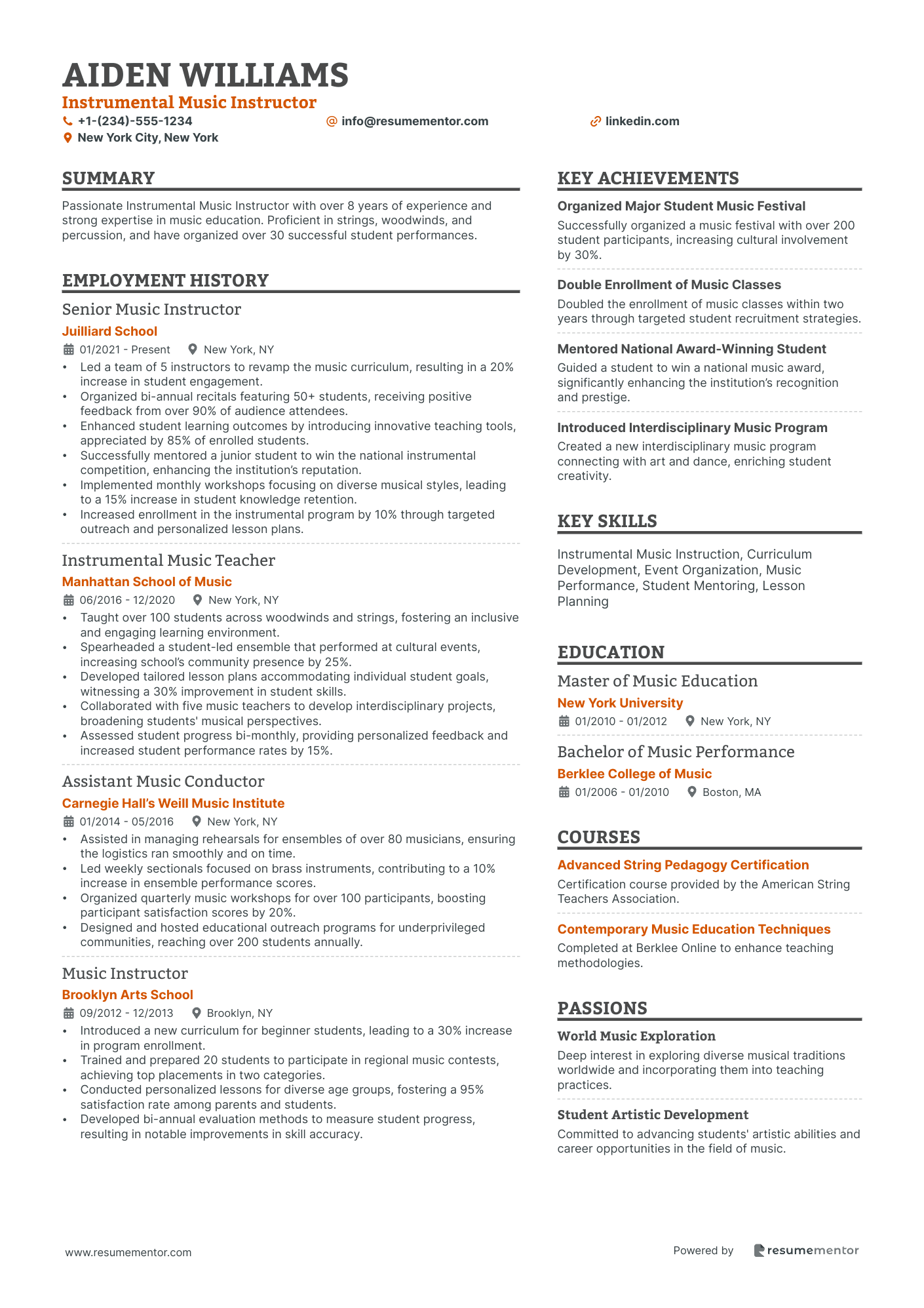
Instrumental Music Instructor
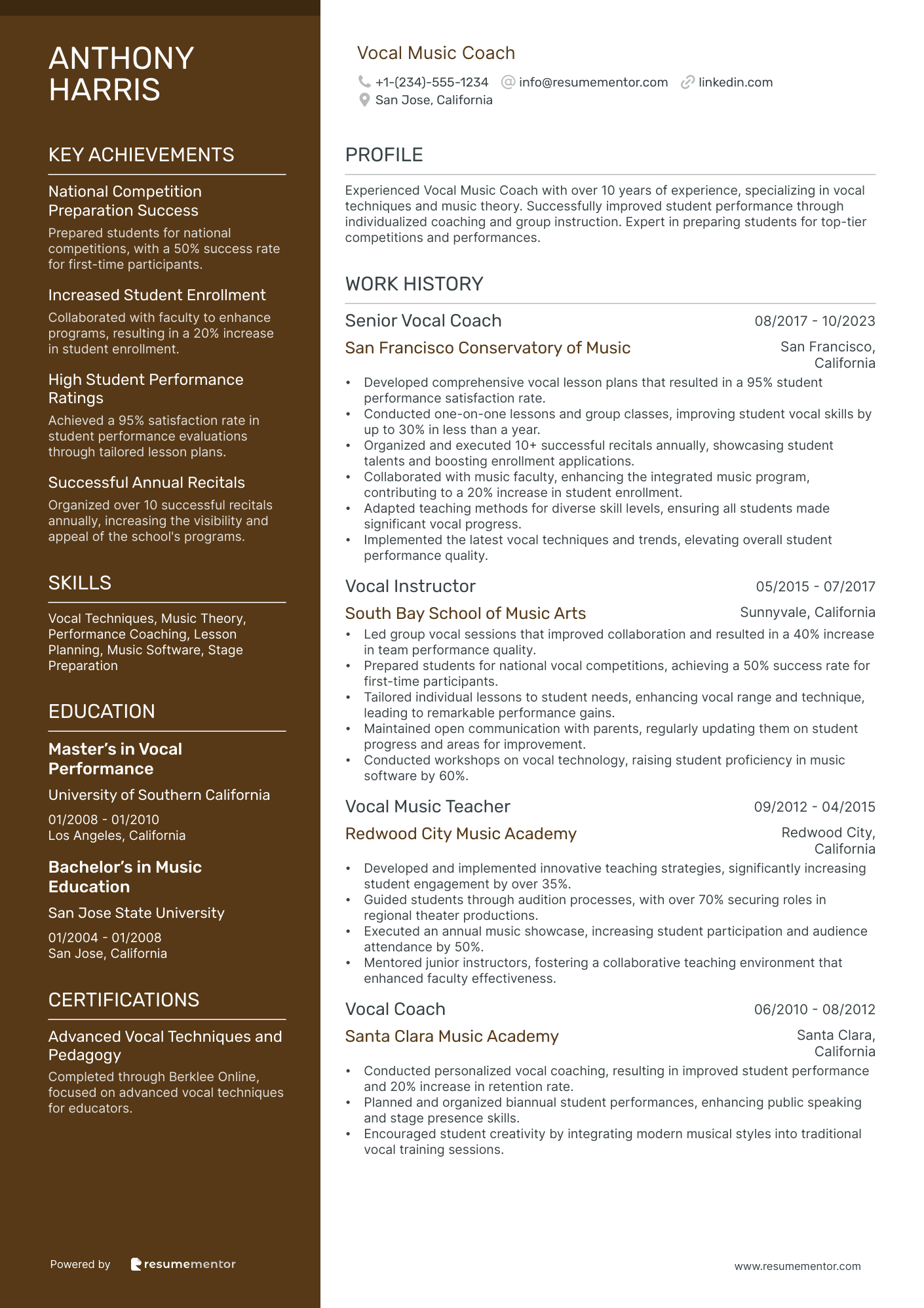
Vocal Music Coach
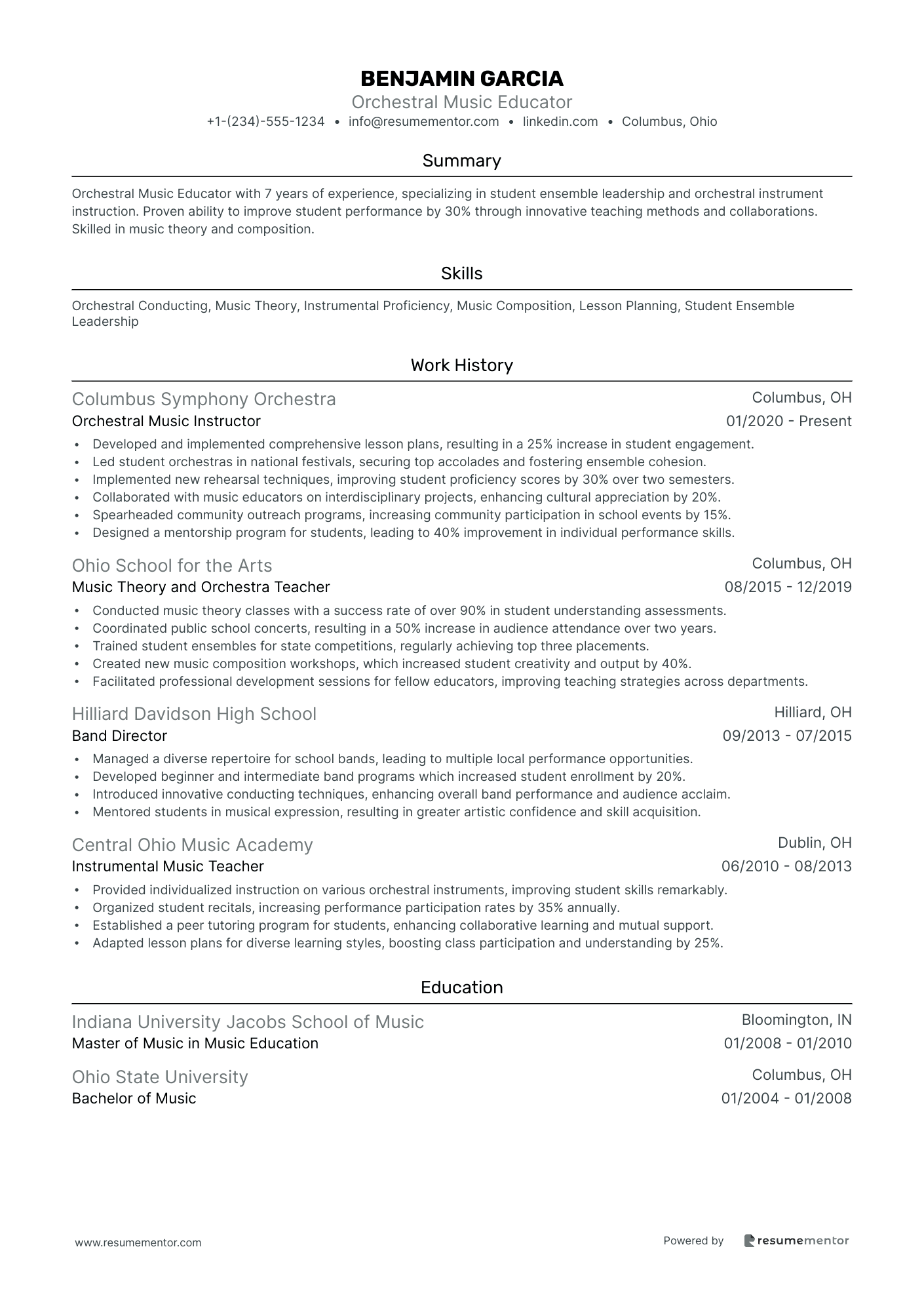
Orchestral Music Educator
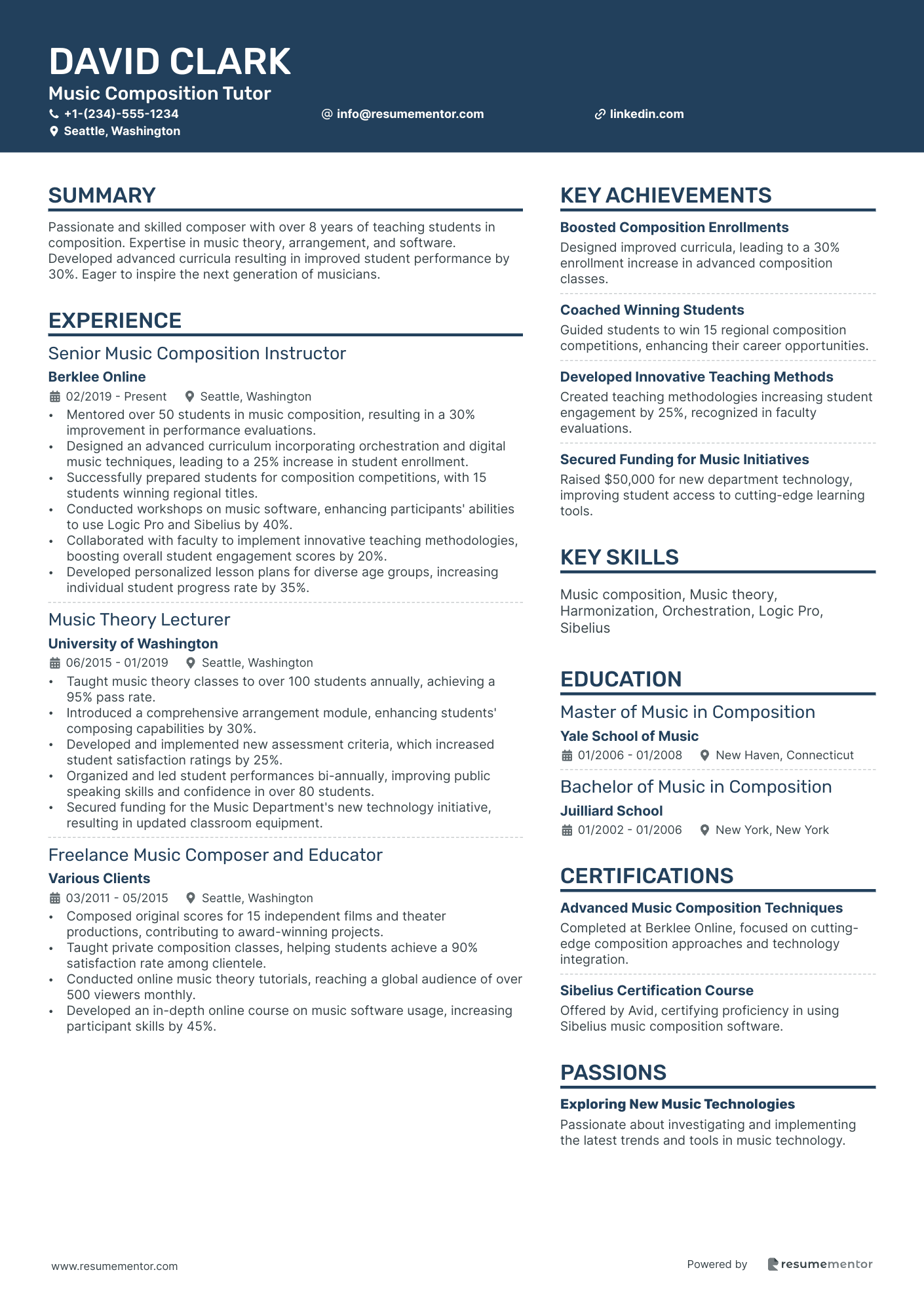
Music Composition Tutor
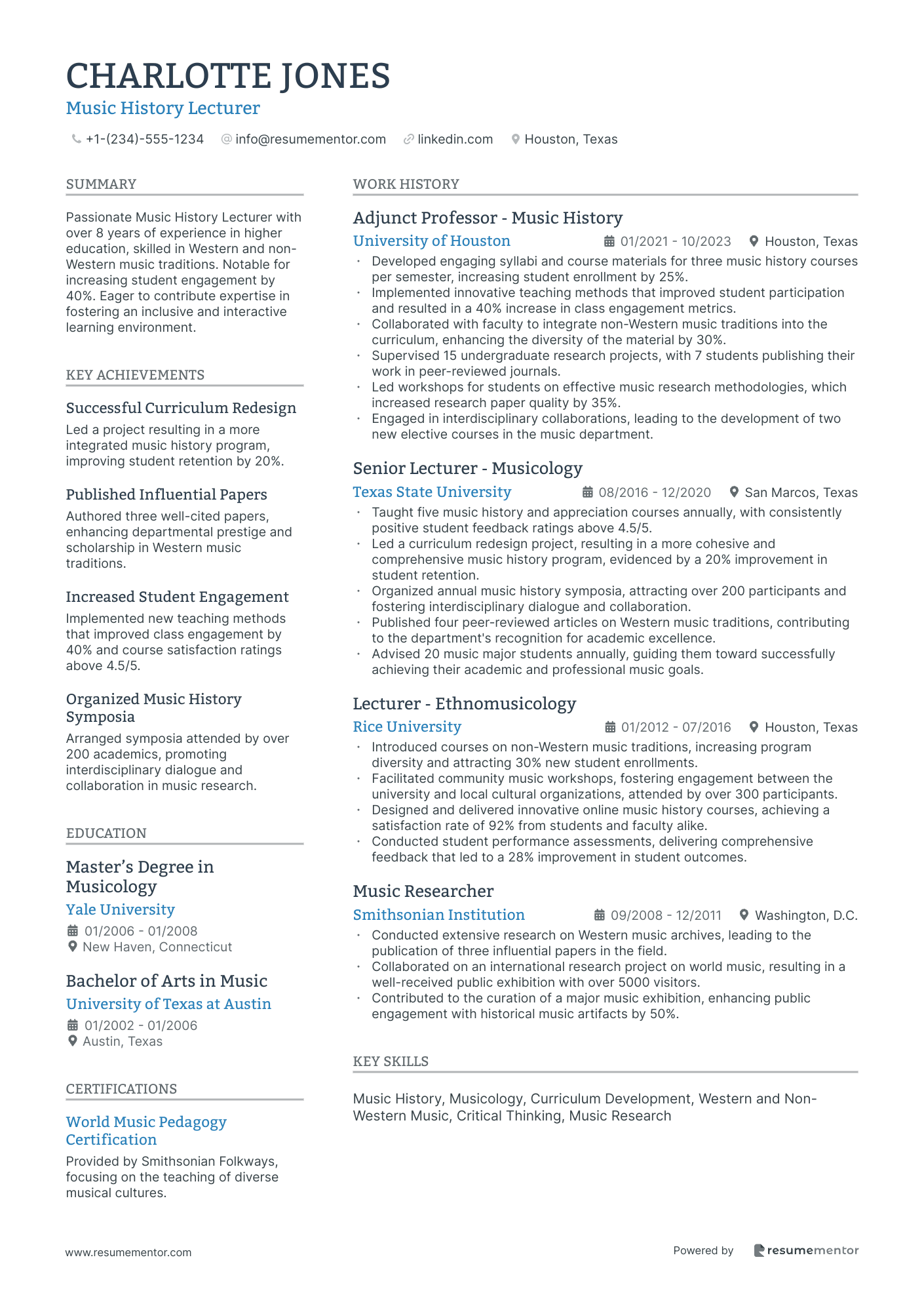
Music History Lecturer
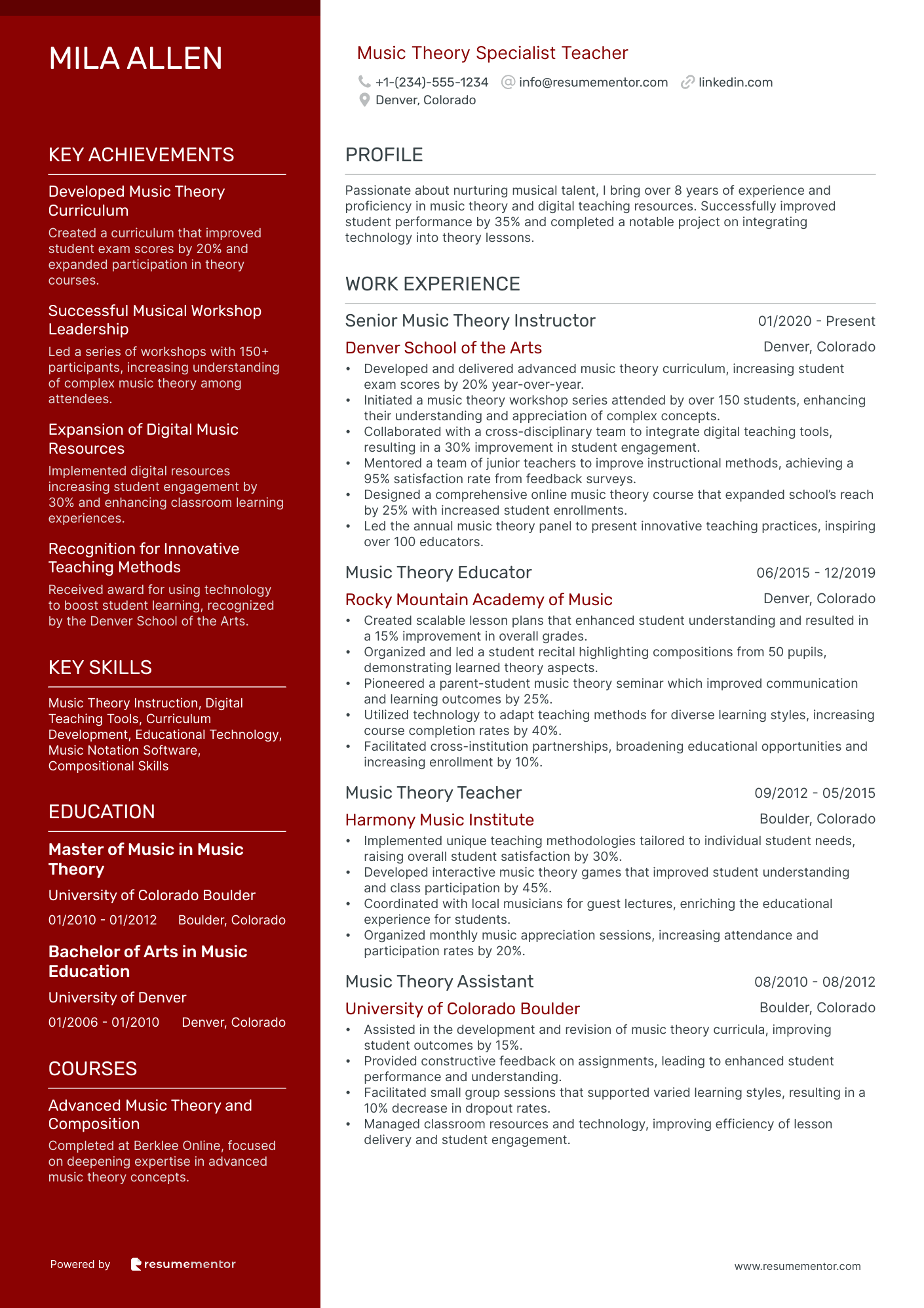
Music Theory Specialist Teacher
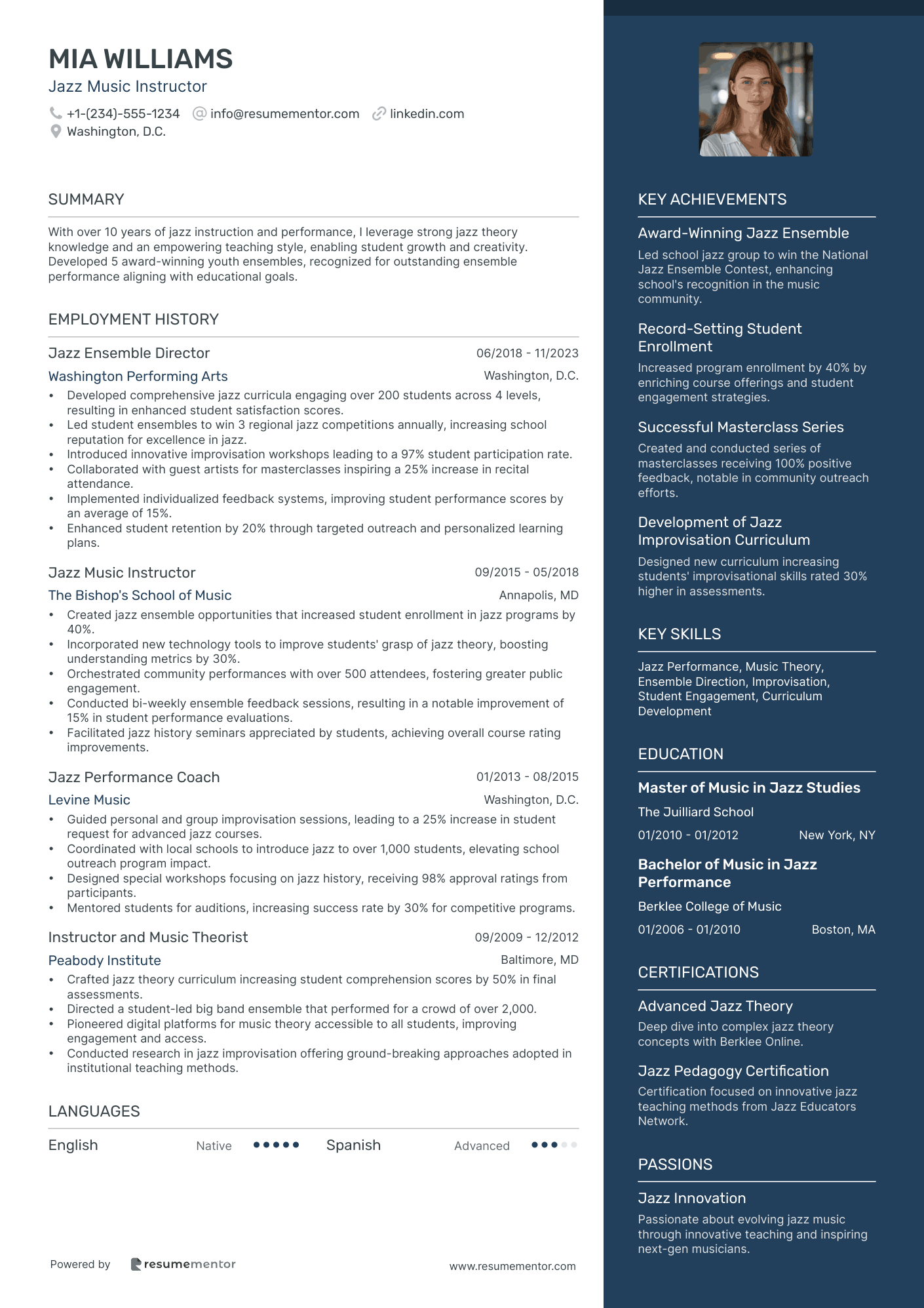
Jazz Music Instructor
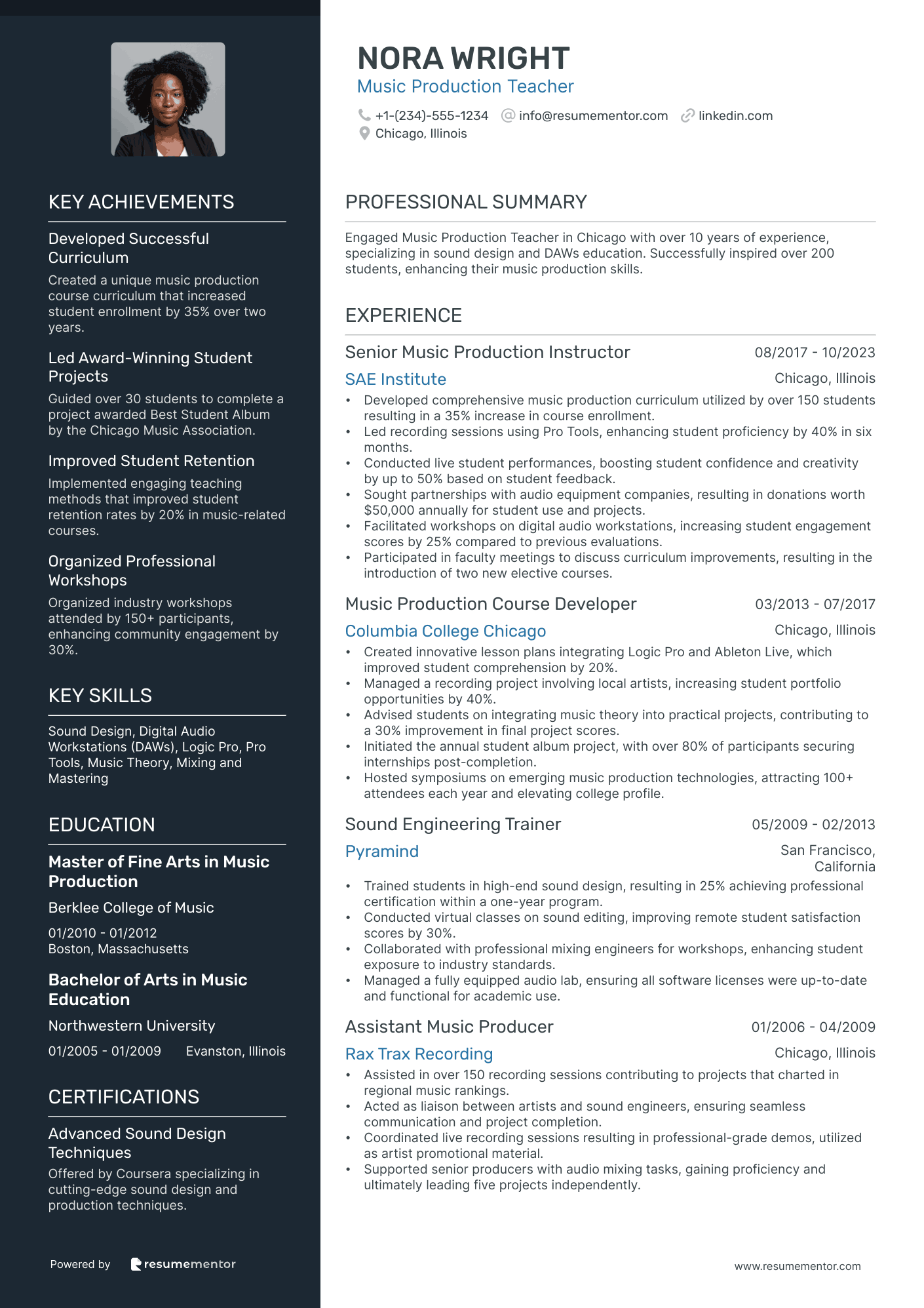
Music Production Teacher
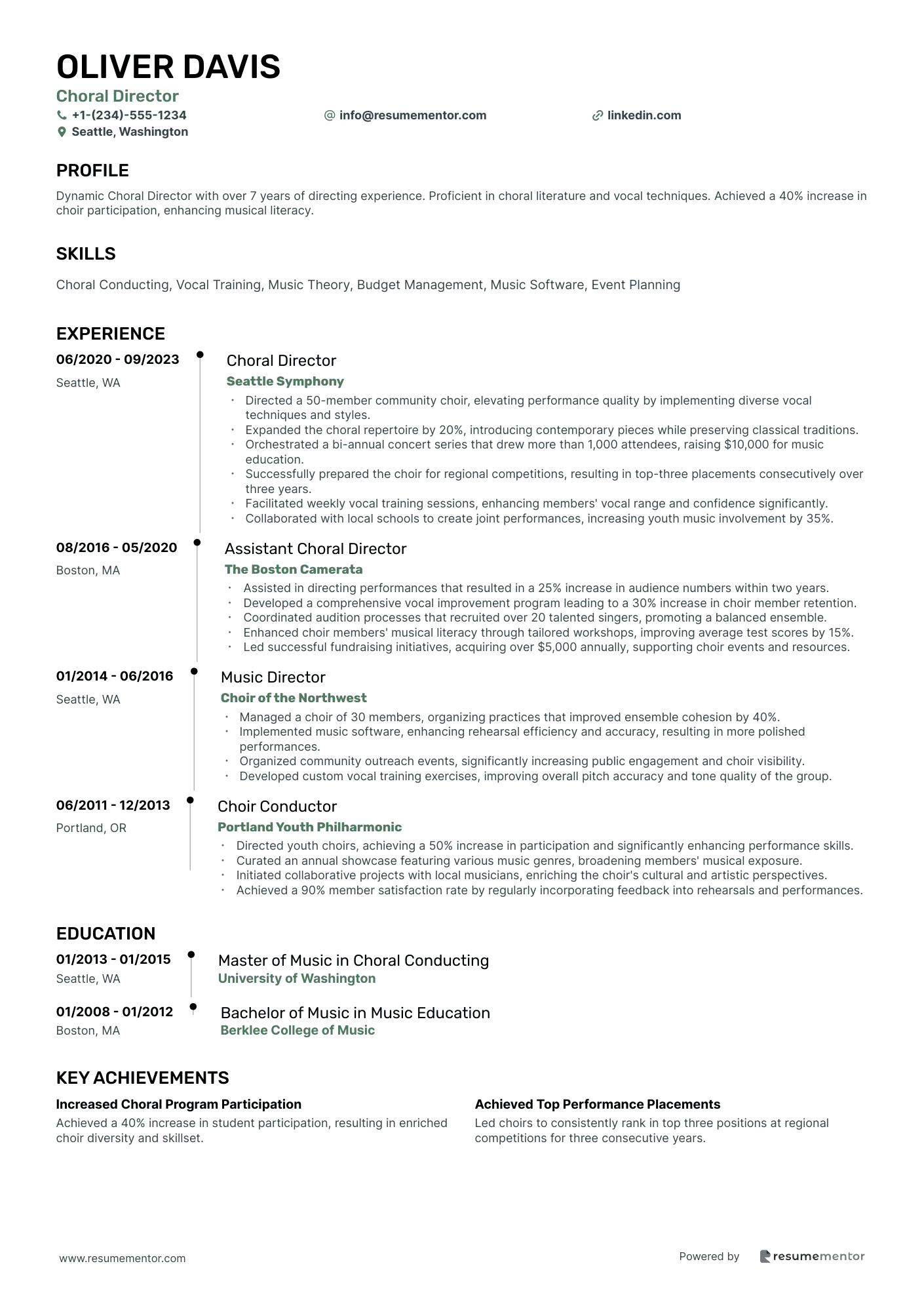
Choral Director
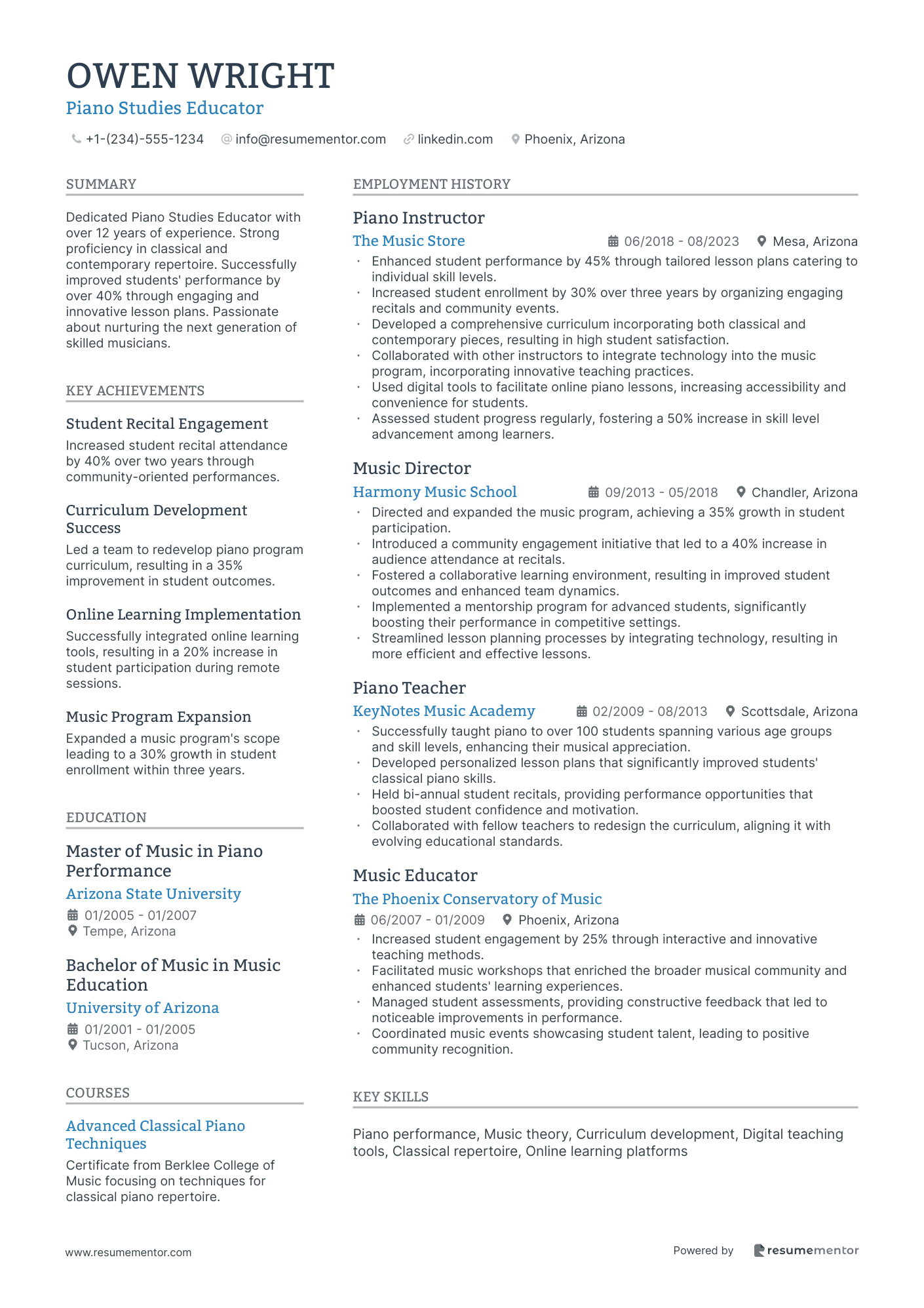
Piano Studies Educator

Instrumental Music Instructor resume sample
- •Led a team of 5 instructors to revamp the music curriculum, resulting in a 20% increase in student engagement.
- •Organized bi-annual recitals featuring 50+ students, receiving positive feedback from over 90% of audience attendees.
- •Enhanced student learning outcomes by introducing innovative teaching tools, appreciated by 85% of enrolled students.
- •Successfully mentored a junior student to win the national instrumental competition, enhancing the institution’s reputation.
- •Implemented monthly workshops focusing on diverse musical styles, leading to a 15% increase in student knowledge retention.
- •Increased enrollment in the instrumental program by 10% through targeted outreach and personalized lesson plans.
- •Taught over 100 students across woodwinds and strings, fostering an inclusive and engaging learning environment.
- •Spearheaded a student-led ensemble that performed at cultural events, increasing school’s community presence by 25%.
- •Developed tailored lesson plans accommodating individual student goals, witnessing a 30% improvement in student skills.
- •Collaborated with five music teachers to develop interdisciplinary projects, broadening students' musical perspectives.
- •Assessed student progress bi-monthly, providing personalized feedback and increased student performance rates by 15%.
- •Assisted in managing rehearsals for ensembles of over 80 musicians, ensuring the logistics ran smoothly and on time.
- •Led weekly sectionals focused on brass instruments, contributing to a 10% increase in ensemble performance scores.
- •Organized quarterly music workshops for over 100 participants, boosting participant satisfaction scores by 20%.
- •Designed and hosted educational outreach programs for underprivileged communities, reaching over 200 students annually.
- •Introduced a new curriculum for beginner students, leading to a 30% increase in program enrollment.
- •Trained and prepared 20 students to participate in regional music contests, achieving top placements in two categories.
- •Conducted personalized lessons for diverse age groups, fostering a 95% satisfaction rate among parents and students.
- •Developed bi-annual evaluation methods to measure student progress, resulting in notable improvements in skill accuracy.
Vocal Music Coach resume sample
- •Developed comprehensive vocal lesson plans that resulted in a 95% student performance satisfaction rate.
- •Conducted one-on-one lessons and group classes, improving student vocal skills by up to 30% in less than a year.
- •Organized and executed 10+ successful recitals annually, showcasing student talents and boosting enrollment applications.
- •Collaborated with music faculty, enhancing the integrated music program, contributing to a 20% increase in student enrollment.
- •Adapted teaching methods for diverse skill levels, ensuring all students made significant vocal progress.
- •Implemented the latest vocal techniques and trends, elevating overall student performance quality.
- •Led group vocal sessions that improved collaboration and resulted in a 40% increase in team performance quality.
- •Prepared students for national vocal competitions, achieving a 50% success rate for first-time participants.
- •Tailored individual lessons to student needs, enhancing vocal range and technique, leading to remarkable performance gains.
- •Maintained open communication with parents, regularly updating them on student progress and areas for improvement.
- •Conducted workshops on vocal technology, raising student proficiency in music software by 60%.
- •Developed and implemented innovative teaching strategies, significantly increasing student engagement by over 35%.
- •Guided students through audition processes, with over 70% securing roles in regional theater productions.
- •Executed an annual music showcase, increasing student participation and audience attendance by 50%.
- •Mentored junior instructors, fostering a collaborative teaching environment that enhanced faculty effectiveness.
- •Conducted personalized vocal coaching, resulting in improved student performance and 20% increase in retention rate.
- •Planned and organized biannual student performances, enhancing public speaking and stage presence skills.
- •Encouraged student creativity by integrating modern musical styles into traditional vocal training sessions.
Orchestral Music Educator resume sample
- •Developed and implemented comprehensive lesson plans, resulting in a 25% increase in student engagement.
- •Led student orchestras in national festivals, securing top accolades and fostering ensemble cohesion.
- •Implemented new rehearsal techniques, improving student proficiency scores by 30% over two semesters.
- •Collaborated with music educators on interdisciplinary projects, enhancing cultural appreciation by 20%.
- •Spearheaded community outreach programs, increasing community participation in school events by 15%.
- •Designed a mentorship program for students, leading to 40% improvement in individual performance skills.
- •Conducted music theory classes with a success rate of over 90% in student understanding assessments.
- •Coordinated public school concerts, resulting in a 50% increase in audience attendance over two years.
- •Trained student ensembles for state competitions, regularly achieving top three placements.
- •Created new music composition workshops, which increased student creativity and output by 40%.
- •Facilitated professional development sessions for fellow educators, improving teaching strategies across departments.
- •Managed a diverse repertoire for school bands, leading to multiple local performance opportunities.
- •Developed beginner and intermediate band programs which increased student enrollment by 20%.
- •Introduced innovative conducting techniques, enhancing overall band performance and audience acclaim.
- •Mentored students in musical expression, resulting in greater artistic confidence and skill acquisition.
- •Provided individualized instruction on various orchestral instruments, improving student skills remarkably.
- •Organized student recitals, increasing performance participation rates by 35% annually.
- •Established a peer tutoring program for students, enhancing collaborative learning and mutual support.
- •Adapted lesson plans for diverse learning styles, boosting class participation and understanding by 25%.
Music Composition Tutor resume sample
- •Mentored over 50 students in music composition, resulting in a 30% improvement in performance evaluations.
- •Designed an advanced curriculum incorporating orchestration and digital music techniques, leading to a 25% increase in student enrollment.
- •Successfully prepared students for composition competitions, with 15 students winning regional titles.
- •Conducted workshops on music software, enhancing participants' abilities to use Logic Pro and Sibelius by 40%.
- •Collaborated with faculty to implement innovative teaching methodologies, boosting overall student engagement scores by 20%.
- •Developed personalized lesson plans for diverse age groups, increasing individual student progress rate by 35%.
- •Taught music theory classes to over 100 students annually, achieving a 95% pass rate.
- •Introduced a comprehensive arrangement module, enhancing students' composing capabilities by 30%.
- •Developed and implemented new assessment criteria, which increased student satisfaction ratings by 25%.
- •Organized and led student performances bi-annually, improving public speaking skills and confidence in over 80 students.
- •Secured funding for the Music Department's new technology initiative, resulting in updated classroom equipment.
- •Composed original scores for 15 independent films and theater productions, contributing to award-winning projects.
- •Taught private composition classes, helping students achieve a 90% satisfaction rate among clientele.
- •Conducted online music theory tutorials, reaching a global audience of over 500 viewers monthly.
- •Developed an in-depth online course on music software usage, increasing participant skills by 45%.
- •Directed over 20 symphony performances annually, garnering positive reviews and a 20% increase in audience attendance.
- •Managed a team of 8 instructors, improving overall efficiency and student performance evaluation scores by 30%.
- •Initiated the 'Young Composers' program, which increased youth involvement in symphonic music by 50%.
- •Enhanced the orchestra's repertoire through diverse musical genre integration, increasing variety by 40%.
Music History Lecturer resume sample
- •Developed engaging syllabi and course materials for three music history courses per semester, increasing student enrollment by 25%.
- •Implemented innovative teaching methods that improved student participation and resulted in a 40% increase in class engagement metrics.
- •Collaborated with faculty to integrate non-Western music traditions into the curriculum, enhancing the diversity of the material by 30%.
- •Supervised 15 undergraduate research projects, with 7 students publishing their work in peer-reviewed journals.
- •Led workshops for students on effective music research methodologies, which increased research paper quality by 35%.
- •Engaged in interdisciplinary collaborations, leading to the development of two new elective courses in the music department.
- •Taught five music history and appreciation courses annually, with consistently positive student feedback ratings above 4.5/5.
- •Led a curriculum redesign project, resulting in a more cohesive and comprehensive music history program, evidenced by a 20% improvement in student retention.
- •Organized annual music history symposia, attracting over 200 participants and fostering interdisciplinary dialogue and collaboration.
- •Published four peer-reviewed articles on Western music traditions, contributing to the department's recognition for academic excellence.
- •Advised 20 music major students annually, guiding them toward successfully achieving their academic and professional music goals.
- •Introduced courses on non-Western music traditions, increasing program diversity and attracting 30% new student enrollments.
- •Facilitated community music workshops, fostering engagement between the university and local cultural organizations, attended by over 300 participants.
- •Designed and delivered innovative online music history courses, achieving a satisfaction rate of 92% from students and faculty alike.
- •Conducted student performance assessments, delivering comprehensive feedback that led to a 28% improvement in student outcomes.
- •Conducted extensive research on Western music archives, leading to the publication of three influential papers in the field.
- •Collaborated on an international research project on world music, resulting in a well-received public exhibition with over 5000 visitors.
- •Contributed to the curation of a major music exhibition, enhancing public engagement with historical music artifacts by 50%.
Music Theory Specialist Teacher resume sample
- •Developed and delivered advanced music theory curriculum, increasing student exam scores by 20% year-over-year.
- •Initiated a music theory workshop series attended by over 150 students, enhancing their understanding and appreciation of complex concepts.
- •Collaborated with a cross-disciplinary team to integrate digital teaching tools, resulting in a 30% improvement in student engagement.
- •Mentored a team of junior teachers to improve instructional methods, achieving a 95% satisfaction rate from feedback surveys.
- •Designed a comprehensive online music theory course that expanded school’s reach by 25% with increased student enrollments.
- •Led the annual music theory panel to present innovative teaching practices, inspiring over 100 educators.
- •Created scalable lesson plans that enhanced student understanding and resulted in a 15% improvement in overall grades.
- •Organized and led a student recital highlighting compositions from 50 pupils, demonstrating learned theory aspects.
- •Pioneered a parent-student music theory seminar which improved communication and learning outcomes by 25%.
- •Utilized technology to adapt teaching methods for diverse learning styles, increasing course completion rates by 40%.
- •Facilitated cross-institution partnerships, broadening educational opportunities and increasing enrollment by 10%.
- •Implemented unique teaching methodologies tailored to individual student needs, raising overall student satisfaction by 30%.
- •Developed interactive music theory games that improved student understanding and class participation by 45%.
- •Coordinated with local musicians for guest lectures, enriching the educational experience for students.
- •Organized monthly music appreciation sessions, increasing attendance and participation rates by 20%.
- •Assisted in the development and revision of music theory curricula, improving student outcomes by 15%.
- •Provided constructive feedback on assignments, leading to enhanced student performance and understanding.
- •Facilitated small group sessions that supported varied learning styles, resulting in a 10% decrease in dropout rates.
- •Managed classroom resources and technology, improving efficiency of lesson delivery and student engagement.
Jazz Music Instructor resume sample
- •Developed comprehensive jazz curricula engaging over 200 students across 4 levels, resulting in enhanced student satisfaction scores.
- •Led student ensembles to win 3 regional jazz competitions annually, increasing school reputation for excellence in jazz.
- •Introduced innovative improvisation workshops leading to a 97% student participation rate.
- •Collaborated with guest artists for masterclasses inspiring a 25% increase in recital attendance.
- •Implemented individualized feedback systems, improving student performance scores by an average of 15%.
- •Enhanced student retention by 20% through targeted outreach and personalized learning plans.
- •Created jazz ensemble opportunities that increased student enrollment in jazz programs by 40%.
- •Incorporated new technology tools to improve students' grasp of jazz theory, boosting understanding metrics by 30%.
- •Orchestrated community performances with over 500 attendees, fostering greater public engagement.
- •Conducted bi-weekly ensemble feedback sessions, resulting in a notable improvement of 15% in student performance evaluations.
- •Facilitated jazz history seminars appreciated by students, achieving overall course rating improvements.
- •Guided personal and group improvisation sessions, leading to a 25% increase in student request for advanced jazz courses.
- •Coordinated with local schools to introduce jazz to over 1,000 students, elevating school outreach program impact.
- •Designed special workshops focusing on jazz history, receiving 98% approval ratings from participants.
- •Mentored students for auditions, increasing success rate by 30% for competitive programs.
- •Crafted jazz theory curriculum increasing student comprehension scores by 50% in final assessments.
- •Directed a student-led big band ensemble that performed for a crowd of over 2,000.
- •Pioneered digital platforms for music theory accessible to all students, improving engagement and access.
- •Conducted research in jazz improvisation offering ground-breaking approaches adopted in institutional teaching methods.
Music Production Teacher resume sample
- •Developed comprehensive music production curriculum utilized by over 150 students resulting in a 35% increase in course enrollment.
- •Led recording sessions using Pro Tools, enhancing student proficiency by 40% in six months.
- •Conducted live student performances, boosting student confidence and creativity by up to 50% based on student feedback.
- •Sought partnerships with audio equipment companies, resulting in donations worth $50,000 annually for student use and projects.
- •Facilitated workshops on digital audio workstations, increasing student engagement scores by 25% compared to previous evaluations.
- •Participated in faculty meetings to discuss curriculum improvements, resulting in the introduction of two new elective courses.
- •Created innovative lesson plans integrating Logic Pro and Ableton Live, which improved student comprehension by 20%.
- •Managed a recording project involving local artists, increasing student portfolio opportunities by 40%.
- •Advised students on integrating music theory into practical projects, contributing to a 30% improvement in final project scores.
- •Initiated the annual student album project, with over 80% of participants securing internships post-completion.
- •Hosted symposiums on emerging music production technologies, attracting 100+ attendees each year and elevating college profile.
- •Trained students in high-end sound design, resulting in 25% achieving professional certification within a one-year program.
- •Conducted virtual classes on sound editing, improving remote student satisfaction scores by 30%.
- •Collaborated with professional mixing engineers for workshops, enhancing student exposure to industry standards.
- •Managed a fully equipped audio lab, ensuring all software licenses were up-to-date and functional for academic use.
- •Assisted in over 150 recording sessions contributing to projects that charted in regional music rankings.
- •Acted as liaison between artists and sound engineers, ensuring seamless communication and project completion.
- •Coordinated live recording sessions resulting in professional-grade demos, utilized as artist promotional material.
- •Supported senior producers with audio mixing tasks, gaining proficiency and ultimately leading five projects independently.
Choral Director resume sample
- •Directed a 50-member community choir, elevating performance quality by implementing diverse vocal techniques and styles.
- •Expanded the choral repertoire by 20%, introducing contemporary pieces while preserving classical traditions.
- •Orchestrated a bi-annual concert series that drew more than 1,000 attendees, raising $10,000 for music education.
- •Successfully prepared the choir for regional competitions, resulting in top-three placements consecutively over three years.
- •Facilitated weekly vocal training sessions, enhancing members' vocal range and confidence significantly.
- •Collaborated with local schools to create joint performances, increasing youth music involvement by 35%.
- •Assisted in directing performances that resulted in a 25% increase in audience numbers within two years.
- •Developed a comprehensive vocal improvement program leading to a 30% increase in choir member retention.
- •Coordinated audition processes that recruited over 20 talented singers, promoting a balanced ensemble.
- •Enhanced choir members' musical literacy through tailored workshops, improving average test scores by 15%.
- •Led successful fundraising initiatives, acquiring over $5,000 annually, supporting choir events and resources.
- •Managed a choir of 30 members, organizing practices that improved ensemble cohesion by 40%.
- •Implemented music software, enhancing rehearsal efficiency and accuracy, resulting in more polished performances.
- •Organized community outreach events, significantly increasing public engagement and choir visibility.
- •Developed custom vocal training exercises, improving overall pitch accuracy and tone quality of the group.
- •Directed youth choirs, achieving a 50% increase in participation and significantly enhancing performance skills.
- •Curated an annual showcase featuring various music genres, broadening members' musical exposure.
- •Initiated collaborative projects with local musicians, enriching the choir's cultural and artistic perspectives.
- •Achieved a 90% member satisfaction rate by regularly incorporating feedback into rehearsals and performances.
Piano Studies Educator resume sample
- •Enhanced student performance by 45% through tailored lesson plans catering to individual skill levels.
- •Increased student enrollment by 30% over three years by organizing engaging recitals and community events.
- •Developed a comprehensive curriculum incorporating both classical and contemporary pieces, resulting in high student satisfaction.
- •Collaborated with other instructors to integrate technology into the music program, incorporating innovative teaching practices.
- •Used digital tools to facilitate online piano lessons, increasing accessibility and convenience for students.
- •Assessed student progress regularly, fostering a 50% increase in skill level advancement among learners.
- •Directed and expanded the music program, achieving a 35% growth in student participation.
- •Introduced a community engagement initiative that led to a 40% increase in audience attendance at recitals.
- •Fostered a collaborative learning environment, resulting in improved student outcomes and enhanced team dynamics.
- •Implemented a mentorship program for advanced students, significantly boosting their performance in competitive settings.
- •Streamlined lesson planning processes by integrating technology, resulting in more efficient and effective lessons.
- •Successfully taught piano to over 100 students spanning various age groups and skill levels, enhancing their musical appreciation.
- •Developed personalized lesson plans that significantly improved students' classical piano skills.
- •Held bi-annual student recitals, providing performance opportunities that boosted student confidence and motivation.
- •Collaborated with fellow teachers to redesign the curriculum, aligning it with evolving educational standards.
- •Increased student engagement by 25% through interactive and innovative teaching methods.
- •Facilitated music workshops that enriched the broader musical community and enhanced students' learning experiences.
- •Managed student assessments, providing constructive feedback that led to noticeable improvements in performance.
- •Coordinated music events showcasing student talent, leading to positive community recognition.
As a music teacher, crafting your resume can feel like orchestrating a symphony, where each element must work in harmony to capture the attention of potential employers. The challenge lies in expressing your diverse skills and teaching style without a clear format. This is where using a resume template comes in handy, providing the structure needed to highlight your unique approach and educational impact.
With a template as your guiding staff, you can focus on showcasing your accomplishments and creativity without the distractions of formatting struggles. Your resume becomes more than a list of jobs—it's a reflection of your artistic journey and teaching expertise. As you assemble it, consider the elements that define you as an educator: your adaptive teaching methods, your ability to inspire, and your deep understanding of music education.
Presenting yourself in this way ensures that your resume resonates with hiring committees, making it the opening act they can’t forget. By investing time and effort into crafting a compelling resume, you enhance your chances of landing that dream teaching position. So, let your professional story unfold like a beautiful melody, capturing the essence of who you are as a music teacher.
Key Takeaways
- Using a resume template helps music teachers structure their resume to highlight their skills and educational impact effectively.
- A music teacher resume should showcase the teacher's dedication, diverse teaching methods, communication skills, and ability to inspire students.
- The resume should include an objective statement, education, teaching experience, musical competence, certifications, professional development, achievements, and any relevant volunteer experience.
- Choosing the right resume format and using modern fonts can help in presenting information clearly and professionally.
- An impactful experience section should highlight accomplishments with strong action verbs and quantifiable results, aligning with the employer's needs.
What to focus on when writing your music teacher resume
A music teacher resume should convey your dedication to developing students' musical talents and highlight your ability to create an engaging learning environment. As you present your passion for music education, it's important to emphasize your skills with various instruments and teaching methods, capturing a recruiter's attention. To do this effectively, your resume should demonstrate how you plan and deliver lessons while showcasing your strong communication and teamwork abilities.
How to structure your music teacher resume
- Objective Statement — A well-crafted objective statement sets the tone for your resume. It should reflect your teaching philosophy and goals while linking these ideas to your specific accomplishments or ambitions in the field of music education. This statement is an opportunity to highlight your passion and give the recruiter a snapshot of what drives you as a music teacher, emphasizing your eagerness to contribute to the learning environment and student success.
- Education — Your educational background is crucial in establishing your credibility as a music teacher. Clearly outline your degrees, majors, or minors in music and education, emphasizing any honors or awards that underscore your academic achievements. This section not only highlights your formal qualifications but also demonstrates your commitment to learning and mastery over the content you teach.
- Teaching Experience — This section is key to demonstrating your hands-on experience. Highlight your previous roles in music teaching, focusing on leadership in programs or ensembles like bands or choirs. Include details about your responsibilities and achievements, showcasing how you have successfully applied your teaching philosophy in practical settings, and positively impacted your students' musical journeys.
- Musical Competence — Here, you should showcase your musical talents by listing instruments you play well and any unique abilities you possess, such as conducting or arranging. This illustrates your depth and breadth of musical expertise, adding layers to your abilities as an educator and helping potential employers understand the range of your skills.
- Certifications and Professional Development — List all relevant teaching certifications and detail any professional development activities you’ve undertaken. Highlight specialized training in music education software or innovative methodologies, underscoring your commitment to staying current and effective in your teaching practices. This section helps certify your credibility and willingness to adapt to new teaching trends and techniques.
- Achievements and Awards — Use this section to highlight recognitions that reflect your excellence in music education. Include noteworthy student performances in competitions and any personal accolades that speak to your talent and effectiveness as a teacher. This can strengthen your application by showcasing tangible successes and milestones in your career.
Finally, consider including sections like Volunteer Experience or Workshops Led, which describe your contributions to community music programs or your roles in conducting seminars. These highlight your engagement beyond the classroom and showcase additional dimensions of your teaching style. Below, we'll delve into each resume section more thoroughly to help you craft a compelling and comprehensive document.
Which resume format to choose
Creating the perfect resume as a music teacher starts with selecting the right format. With steady experience in education, a chronological format suits you best. This format allows you to showcase your teaching journey, making it easy for employers to understand your career progression step by step. However, if your experience is more diverse or has gaps, a functional format could be more beneficial, as it puts the spotlight on your versatile skills and unique abilities that set you apart in the classroom.
Choosing the right font for your resume can also make an important impact. Modern fonts like Raleway, Lato, or Montserrat offer a refreshing look that is not only attractive but also enhances readability. These fonts help your resume stand out without being overwhelming, ensuring it remains professional and easy for music program directors or school administrators to read.
To ensure a polished and consistent presentation, always save and send your resume as a PDF. This file type locks in your formatting, so all your hard work and attention to detail are preserved, no matter how or where your resume is viewed.
Lastly, pay careful attention to your margins. Keeping them at one inch on all sides not only provides a clean and organized appearance but also helps frame your content in a way that is aesthetically pleasing and easy on the eyes. This becomes particularly important when conveying detailed information about your teaching philosophy or successes in student growth, allowing for enough white space to keep the reader focused.
By thoughtfully integrating these elements, your resume will make a strong first impression, effectively communicating your expertise and passion for music education.
How to write a quantifiable resume experience section
Creating an impactful music teacher resume is essential for making a strong impression on employers. Your experience section should highlight accomplishments that showcase your ability to inspire and engage students through music. Organize it by listing jobs in reverse chronological order, focusing on the last 10-15 years or the roles most relevant to the position. Tailor each entry by reflecting the language of the job ad, emphasizing skills that meet the employer's needs. Use strong action verbs like “orchestrated,” “developed,” “mentored,” and “conducted” to bring your achievements to life. Each bullet point should demonstrate quantifiable success, offering clear evidence of your impact.
- •Boosted student participation by 30% in four years with engaging curriculums.
- •Led the school orchestra to win state championships twice in five years with focused training.
- •Started a mentor program for new students that improved retention by 20%.
- •Organized school-wide music events that saw 40% audience growth in three years.
Connecting your achievements to a potential employer’s needs makes this experience section effective. Each bullet point offers measurable results, ensuring your contributions are clear and compelling. By using action verbs like “boosted,” “led,” and “started,” you convey a sense of initiative and accomplishment. This structure is clear and focused, spotlighting the metrics that prove your teaching abilities. By aligning your experiences with job requirements, your resume is more likely to capture the attention of employers who value proven success.
Technology-Focused resume experience section
A technology-focused music teacher resume experience section should effectively intertwine your skills with your ability to integrate technology into music education. Start by listing your job title, workplace, and the dates you worked there, ensuring that these details are clear. In each role, highlight how you've incorporated technology into your music lessons to enhance student learning and engagement. Whether you’ve used music composition software or online resources for teaching music theory, make sure to emphasize your innovative approaches.
When crafting your bullet points, focus on your distinct contributions and accomplishments. Consider how new tools or software you've introduced have improved the teaching process, or reflect on any tech-based initiatives you led that positively impacted your students or school. Use simple and direct language, concentrating on achievements and their results. By clearly outlining your responsibilities and successes, potential employers will gain a clearer understanding of how your expertise can benefit their organization.
Music Teacher
Harmony School of Music
January 2018 - August 2023
- Created interactive music theory lessons using digital tools, boosting student engagement by 30%.
- Introduced music composition software, enabling students to create and share their own music.
- Organized virtual concerts with streaming tech, expanding the audience and enhancing students' experience.
- Trained other teachers in using technology to support music education, enriching the school's curriculum.
Efficiency-Focused resume experience section
An efficiency-focused music teacher resume experience section should clearly show how you've streamlined processes and improved the educational environment. Start by emphasizing the strategies you've employed to make lessons more productive, such as incorporating technology to simplify instruction or reworking lesson plans to better manage time and engage students. These efforts not only enhance learning but also positively impact both students and the school's overall performance.
Use clear and strong action words in your descriptions to highlight how you've effectively utilized time and resources. Share the tangible results of your initiatives, like improved student performance or increased participation in musical activities. Strengthen your accomplishments by including quantifiable data, such as the percentage of students who improved their skills or any awards they received during your tenure.
Music Teacher
Harmony Elementary School
August 2018 - June 2023
- Revamped the music curriculum, reducing redundant lessons and saving 20% in instruction time while boosting student performance averages by 15%.
- Introduced digital tools to simplify theory lessons, which cut preparation time in half and allowed more practice time for students.
- Coordinated events that involved over 200 students each year, increasing participation in school concerts by 30%.
- Implemented a peer-teaching system, enhancing student leadership skills and freeing up additional time for one-on-one guidance.
Skills-Focused resume experience section
A skills-focused music teacher resume experience section should clearly showcase how your talents make a difference in the classroom. Instead of listing every task, focus on highlighting the skills that enhance learning and inspire students. Using strong action verbs, describe how your abilities transform the educational environment. Where possible, include numbers to quantify your achievements, such as how many students you taught or awards received. This approach ensures your resume stands out as dynamic and emphasizes your positive impact.
Begin by stating your job title, the workplace, and the duration of your employment. Follow this with bullet points that highlight the skills you used and their impact. Emphasize a range of competencies, like communication, organization, and music expertise, to paint a comprehensive picture. Each bullet should be clear and focused, showcasing how your skills led to successful outcomes. This makes your contributions obvious and conveys your experience effectively.
Music Teacher
Harmony Arts Academy
September 2019 - June 2022
- Crafted personalized lesson plans that boosted student performance by 15% over a year.
- Coordinated a school-wide music festival featuring over 100 student performers with great success.
- Integrated diverse musical styles and instruments, which increased student engagement and enjoyment.
- Guided a junior teaching assistant, helping them develop into a successful music teacher.
Collaboration-Focused resume experience section
A collaboration-focused music teacher resume experience section should clearly demonstrate how effectively you work with others to enhance educational outcomes. Begin by describing instances when you collaborated with colleagues, students, or the community to improve the learning experience. Share stories of joint projects or events, and explain how working together led to accomplishments. Including specific outcomes, like increased student participation, helps to illustrate your impact.
Additionally, highlight the diverse ways you've supported teamwork, whether by organizing group performances or developing innovative curricula with fellow educators. Mention any creative teaching strategies or technologies you’ve employed to foster collaboration, detailing the positive results these efforts achieved. This approach not only shows your ability to work well within a team but also emphasizes your role in creating a vibrant and effective educational environment.
Music Teacher
Harmony Academy
2018 - Present
- Organized and led joint performances with local schools, boosting student participation by 30%
- Facilitated regular workshops that brought together students and guest musicians, enriching learning experiences
- Led a team of teachers to develop an interdisciplinary arts curriculum that increased student engagement
- Collaborated with the school’s technology department to integrate digital tools into music classes, enhancing creativity and interaction
Write your music teacher resume summary section
A teaching-focused music teacher resume summary should effectively create a memorable impression by quickly highlighting your skills and experience. As a music teacher, it's important to showcase your teaching abilities alongside unique methods that demonstrate your passion for music education. For instance, you could use this resume summary as a guide:
By emphasizing your experience, expertise, and innovative teaching methods, this summary captures key qualities that employers seek in a candidate. Tailoring your summary to align with the specific job you’re applying for is always a good practice. When considering different approaches, remember that a resume objective emphasizes your career aspirations, while a resume profile offers a brief overview of your career path. In contrast, a summary of qualifications lists achievements and skills without a narrative. Each serves its purpose, so choose the approach that best complements your experience and job objectives.
Listing your music teacher skills on your resume
A skills-focused music teacher resume should clearly showcase your talents and expertise. You can either create a standalone skills section or seamlessly integrate your skills into sections like experience and summary. As a music teacher, highlighting strengths like communication and patience can help you connect with students. Hard skills are your technical abilities, such as playing instruments or understanding music theory, which are essential for teaching. Skills and strengths act as keywords and make your resume more noticeable to employers. By clearly identifying your abilities, you ensure your resume stands out from the crowd.
Here's how you can format your skills section:
This example is effective because it focuses on the skills that a music teacher needs, making it simple for employers to understand your qualifications quickly.
Best hard skills to feature on your music teacher resume
Hard skills are all about your technical expertise and teaching capabilities. Featuring them on your resume demonstrates that you can instruct and inspire students of all ages.
Hard Skills
- Instrument Proficiency
- Music Theory
- Vocal Techniques
- Ear Training
- Ensemble Direction
- Sight Reading
- Music Composition
- Digital Audio Software
- Lesson Planning
- Performance Preparation
- Curriculum Development
- Music History
- Music Technology
- Recording Techniques
- Formal Assessments
Best soft skills to feature on your music teacher resume
Soft skills are vital for nurturing a supportive learning environment and building strong relationships with students. These skills show how effectively you can engage and encourage young minds.
Soft Skills
- Patience
- Communication
- Adaptability
- Creativity
- Leadership
- Problem Solving
- Organization
- Empathy
- Motivation
- Collaboration
- Time Management
- Active Listening
- Conflict Resolution
- Cultural Awareness
- Enthusiasm
How to include your education on your resume
The education section is a critical component of your music teacher resume. It provides insight into your academic background and helps employers determine if you have the necessary qualifications. Tailor this section to the position by including only relevant education—omit anything unrelated to music teaching. When listing your degree, be clear and concise, specifying the type and major. If applicable, include honors like "cum laude" right after your degree to highlight your academic successes. If your GPA is a strong point, list it in the format: "GPA: 3.8/4.0".
Wrong example:
- •Led a robotics club.
Right example:
The right example effectively highlights the key elements required for a music teacher position. It includes the appropriate degree, "Bachelor of Music, Music Education," showing clear relevance to the job. It omits unnecessary location details, focusing instead on the impressive GPA of 3.9, underscoring academic excellence. The selected timeframe reflects a coherent educational path. This makes the information easy to read and directly applicable to the skills sought for a music teaching role.
How to include music teacher certificates on your resume
Including a certificates section in your music teacher resume is crucial. Make sure you list the name of each certificate you have earned. Include the date you received it and add the issuing organization. For example, if you have a "Certified Music Educator" certificate, you would list "Certified Music Educator - June 2020 - National Association for Music Education."
Certificates can also be included in the header to grab immediate attention. For instance, if you have a "Kodaly Music Education Certificate," your header can read: "Jane Doe, Certified Music Educator (Kodaly Method)." Having these credentials upfront shows your qualifications right away.
A good example of a standalone certificates section could look like this:
This example is strong because it includes relevant and recognized certificates. It showcases variety, demonstrating both general and specialized skills in music education. By including the issuing organizations, you add credibility and show your qualifications are authentic. This layout is clear, concise, and directly aligned with the job role, making it easy for hiring managers to see your credentials.
Extra sections to include in your music teacher resume
Creating a compelling resume as a music teacher is a great way to showcase your unique skills and experiences. It's more than just listing your qualifications—it's about telling your story and sharing what makes you uniquely suited for the role.
Language section — List languages you speak fluently, such as English and Spanish. This can show your ability to engage with a diverse student base.
Hobbies and interests section — Share hobbies like playing various instruments or attending music festivals. This highlights your passion for music beyond the classroom.
Volunteer work section — Include experiences such as volunteering at local music events or offering free lessons during college. This demonstrates your dedication to giving back and enriching the community.
Books section — Mention books that have influenced your teaching methods or musical understanding, such as "Musicophilia" by Oliver Sacks. This shows your commitment to continuous learning and professional development.
In Conclusion
In conclusion, crafting a music teacher resume requires an artful blend of showcasing your skills, experiences, and passion for music education. Using a structured approach, with or without templates, can enable you to organize your achievements and capabilities clearly and effectively. Whether you're focusing on hard skills like proficiency in various instruments or highlighting your ability to integrate technology into learning, your resume should reflect a comprehensive picture of your personal and professional development. Tailoring each section, from your objective statement to your education and certificates, ensures that you align with the specific needs and expectations of potential employers. Remember, every part of your resume, from your experience to your extra sections like hobbies and volunteer work, contributes to telling your unique story as an educator. A successful resume not only demonstrates your qualifications but also captures your innovative spirit and dedication to fostering a vibrant learning environment. By connecting your achievements to the broader goals of educational communities, you can set the stage for opportunities that resonate with your passion and ambition. Through attention to detail and a clear presentation, your resume becomes a powerful tool in advancing your career as a music teacher.
Related Articles

Continue Reading
Check more recommended readings to get the job of your dreams.
Resume
Resources
Tools
© 2026. All rights reserved.
Made with love by people who care.

